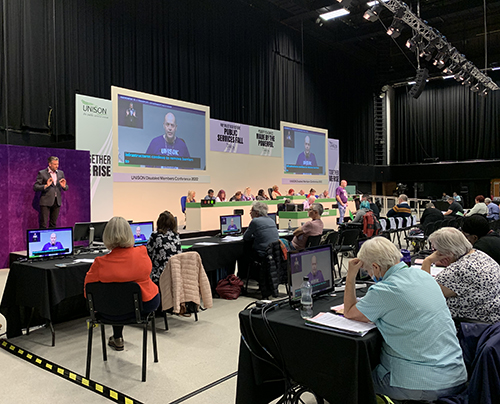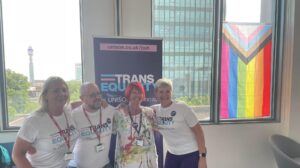Today, UNISON president Andrea Egan opened the union’s 2023 national delegate conference in Liverpool with a speech to members.
Referencing her roots as a Bolton woman, she said “I’m very proud to offer you a warm welcome here to the North West, the biggest of our union’s regions.
“Having been active in my branch for over 30 years, I’ve always been grateful to UNISON for the platform it has given me to fight for our members and within our community.”
Ms Egan also expressed her pride at leading the union through a “critical” year for members, which has seen workers across the union take industrial action for decent wages.
Justice and equality
The president underlined the importance of challenging racism and discrimination in every form across the union, noting: “We’re defending our trans siblings, fighting for dignity for disabled people, and fighting for women’s rights in a world where misogyny and violence towards women remains alarmingly widespread”.
Ms Egan also celebrated the fact that 2023 is the Year of Black Workers, and that the national Black members’ committee has developed a comprehensive work programme for branches, regions and service groups to engage with.
“We’re a movement and we cannot stand by while any of our members continue to face the injustice of racism or any inequality at work or in our communities.”
International solidarity
Ms Egan expressed international solidarity with workers in Cuba and Türkiye, specifically the union’s friends Mehmet Bozgeyik and Osman Isci from KESK, the confederation of public employees’ trade union.
“It’s so important we continue to stand in solidarity with all our intentional comrades around the world.”
Cost of living
On the crippling cost of living crisis in the UK, the president said: “The Tories are on a renewed war path and we’re going to need every ounce of our energy, commitment and resolve for the year ahead”.
And describing how union members have “suffered for 13 years at the end of this Tory austerity project, being fed the Tory lie that there’s no money”, she paid tribute to the resilience of members in fighting for decent pay.
“I’ve been proud to stand with so many of you on your picket lines, standing shoulder to shoulder with many of you in your struggles.
“We had successful strike action in health, and we’ve got the current ballot for a ‘yes’ to industrial action in local government. As each industrial action takes place, we are learning lessons and taking them on to the next ballot.
“Activists are the lifeblood of our union and I’m proud of what you achieve for our members. It’s important to build member power and show support for our comrade unions who are also taking action.
“Of course, conference, this government are not content with holding down pay. They also want to punish working people for wanting to fight back with the anti-strike bill.”
Ms Egan was met with a round of applause when she said “the government suddenly care about staffing levels on strike days, but we know members want to see minimum level standards on all working days”.
She concluded her speech by reminding delegates of her Presidential charity, Endeavour, which offers a wide range of services in Bolton, including frontline community support for domestic abuse survivors.
The article ‘Activists are the lifeblood of our union,’ says Andrea Egan first appeared on the UNISON National site.

